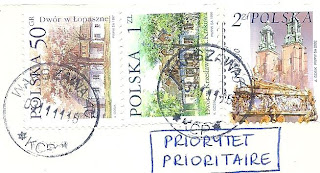
Battle of Grunwald.
Sent by Zuzanna, a postcrosser from Warsaw, Poland.
This is from Wikipedia : The Battle of Grunwald or 1st Battle of Tannenberg was fought on 15 July 1410, during the Polish–Lithuanian–Teutonic War. The alliance of the Kingdom of Poland and the Grand Duchy of Lithuania, led respectively by King Jogaila (Władysław Jagiełło) and Grand Duke Vytautas (Witold), decisively defeated the Teutonic Knights, led by Grand Master Ulrich von Jungingen. Most of the Teutonic Knights' leadership were killed or taken prisoner. While defeated, the Teutonic Knights withstood the siege on their fortress in Marienburg (Malbork) and suffered only minimal territorial losses at the Peace of Thorn (1411) (Toruń). Territorial disputes continued until the Peace of Melno was concluded in 1422. However, the Knights never recovered their former power and the financial burden of war reparations caused internal conflicts and an economic downturn in their lands. The battle shifted the balance of power in Eastern Europe and marked the rise of the Polish–Lithuanian union as the dominant political and military force in the region.
The battle was one of the largest battles in Medieval Europe and is regarded as the most important victory in the history of Poland and Lithuania. It was surrounded by romantic legends and nationalistic propaganda, becoming a larger symbol of struggle against invaders and a source of national pride. During the 20th century, the battle was used in Nazi and Soviet propaganda campaigns. Only in recent decades have historians made progress towards a dispassionate, scholarly assessment of the battle reconciling the previous narratives, which differed widely by nation.
The battle was fought in the territory of the Monastic state of the Teutonic Order, on the plains between three villages: Grünfelde (Grunwald) to the west, Tannenberg (Stębark) to the northeast, and Ludwigsdorf (Łodwigowo, Ludwikowice) to the south. Jogaila referred to the site in Latin as in loco conflictus nostri, quem cum Cruciferis de Prusia habuimus, dicto Grunenvelt. Later Polish chroniclers interpreted the word Grunenvelt as Grünwald, meaning "green forest" in German. The Lithuanians followed suit and translated the name as Žalgiris. The Germans named the battle after Tannenberg ("fir" or "pine" "hill" in German). Thus there are three commonly used names for the battle: German: Schlacht bei Tannenberg, Polish: Bitwa pod Grunwaldem, Lithuanian: Žalgirio mūšis. Its names in the languages of other involved peoples include Belarusian: Дубровенская бітва, Ukrainian: Грюнвальдська битва, Russian: Грюнвальдская битва, Czech: Bitva u Grunvaldu, Romanian: Bătălia de la Grünwald.

No comments:
Post a Comment